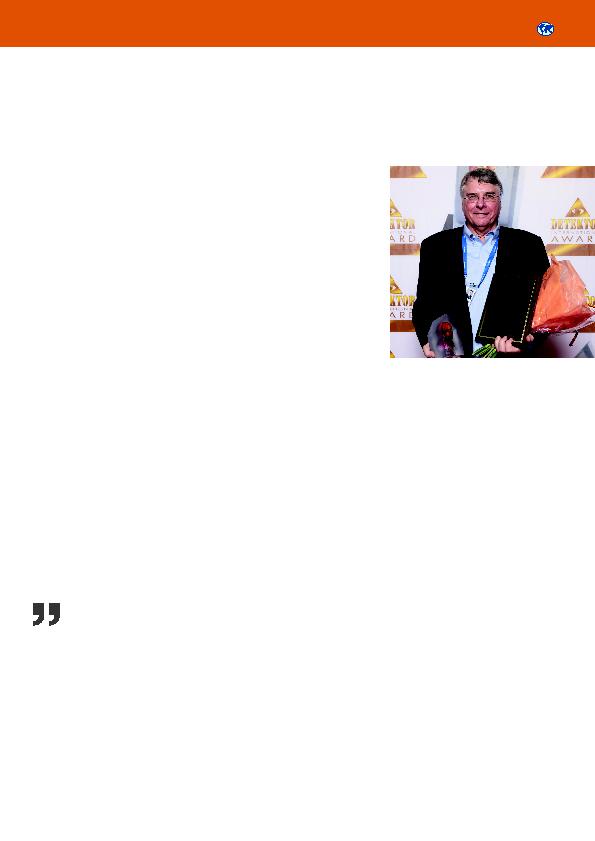
d e t e k t o r i n t e r n a t i o n a l · 4 5
Security News Every Day
www. securityworldmarket.com
Security News Every Day
www. securityworldmarket.com
"Unified systems offer deeper integration"
With the rise of increasingly sophisticated
cyber threats, what threats do customers and
suppliers face?
"The old notion that everything valuable
within castle walls is safe from malicious forces
no longer applies. The modern approach is to
segment your computing environment, meaning
creating small clusters of trusted computers. If
one of these clusters is compromised, your entire
operation isn't endangered.
One of the biggest challenges in cyber secu-
rity is underestimating the cost of cyber security
breaches and neglecting the price of good
cyber hygiene."
How do you see legislation, such as the EU
directives NIS2 and CER, impacting cyber
security integration and the development of
more resilient systems?
"Frameworks that guide responsible deci-
sion-making at the management level are a good
start, but additional accountability measures are
necessary."
"Then, corporate leaders must be held
accountable for providing necessary funding
and ensuring the governance needed to achieve
desired resilience levels. This executive-level ac-
countability is largely missing today, leading to
situations where uninformed executives blame
technical staff when catastrophic errors occur."
How important are open security systems
where different technologies and solutions
can be seamlessly integrated?
"Open architecture systems are based on the
idea that an organisation cannot have enough
resources or knowledge to solve an unlimited set
of demanding real-world problems. Moreover,
there's no single system that can address all real-
world issues."
"Open architecture is a way to tackle such
challenges by allowing those closest to the prob-
lem to combine partial solutions into a larger,
situation-specific system. This enables them to
address enough of the issues quickly and cost-
effectively."
Artificial Intelligence (AI) is affecting many
industries, including security. How do you
see AI shaping the future of our industry?
"AI stands for Absolute Ignorance. The
statistical inference engines perform a mind-
less mapping of inputs to outputs that often
produce seemingly impressive results. We are all
too willing to mistake clever guessing for actual
thinking."
"That's where humans come in. A profes-
sor once noted: what humans find difficult;
computers solve easily. What humans find easy;
computers struggle with."
"I say, let the computer do the heavy lift-
ing and let humans contribute creativity and
judgment. At Genetec, we call this `I.A.,' which
stands for Intelligent Automation."
What are the biggest advantages of bringing
together different security systems on a single
unified platform? And are there any potential
downsides?
"I make a distinction between unified and
integrated systems, where unified systems
involve greater vendor responsibility."
" In merely integrated systems, no compo-
nent vendor takes responsibility for the system's
overall resilience when any of the subsystems
are upgraded, not even the primary system
provider. This can lead to costly surprises for the
customer."
"Unified systems offer deeper integration,
meaning the main provider makes greater ef-
forts to understand and stitch the subsystems
together."
The cloud has become central to data storage
and system management. What are your
thoughts on cloud security, and how can
companies ensure that their sensitive infor-
mation remains protected in cloud-based
environments?
"The major cloud providers have vast cyber
security teams that design their data centres and
monitor operations 24/7 against the constant
onslaught of cyber attacks and ongoing threats.
If all computing needs are handled in the cloud,
the attack surface is relatively small, and mali-
cious actors must resort to social engineering or
weak passwords to access your data."
"However, if your system is distributed with
parts outside the cloud, the attack surface in-
cludes the non-cloud-based components such
as cameras and door controllers."
Looking ahead, which technological trends
or innovations in security do you think will
have the greatest impact in the coming years?
"I would point to hybrid solutions that
allow us to optimise the placement of computa-
tional workloads based on individual organisa-
tions' needs and limitations. Compliance may
require certain workloads to be stored in data
centers. The cost or availability of bandwidth
may motivate keeping large and transient data,
like recorded video, on-site.
Pierre Racz, the founder and CEO of Genetec, participated at the
Skydd security fair in Stockholm, both as a keynote speaker and as a
panel participant in a discussion on trends. In connection with this, he
was interviewed by Detektor International about his views on current
mega-trends: cyber security, cloud solutions, and AI.
Pierre Racz, founder and CEO of Genetec:
Pierre Racz, the founder and CEO of Genetec,
participated at the Skydd security fair in Stockholm.
AI stands for Absolute Ignorance. The statistical
inference engines perform a mindless mapping of
inputs to outputs that often produce seemingly impressive
results. We are all too willing to mistake clever guessing for
actual thinking."
Interviews with entrepreneurs
Editor: Lennart Alexandrie
P
hot
o
: Camill
a S
ven
s
k
